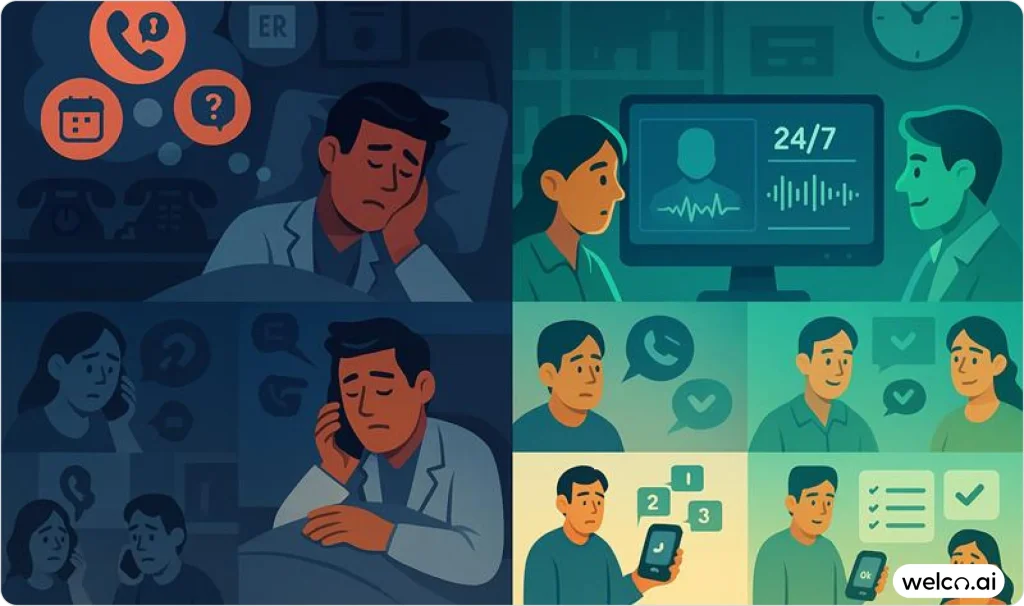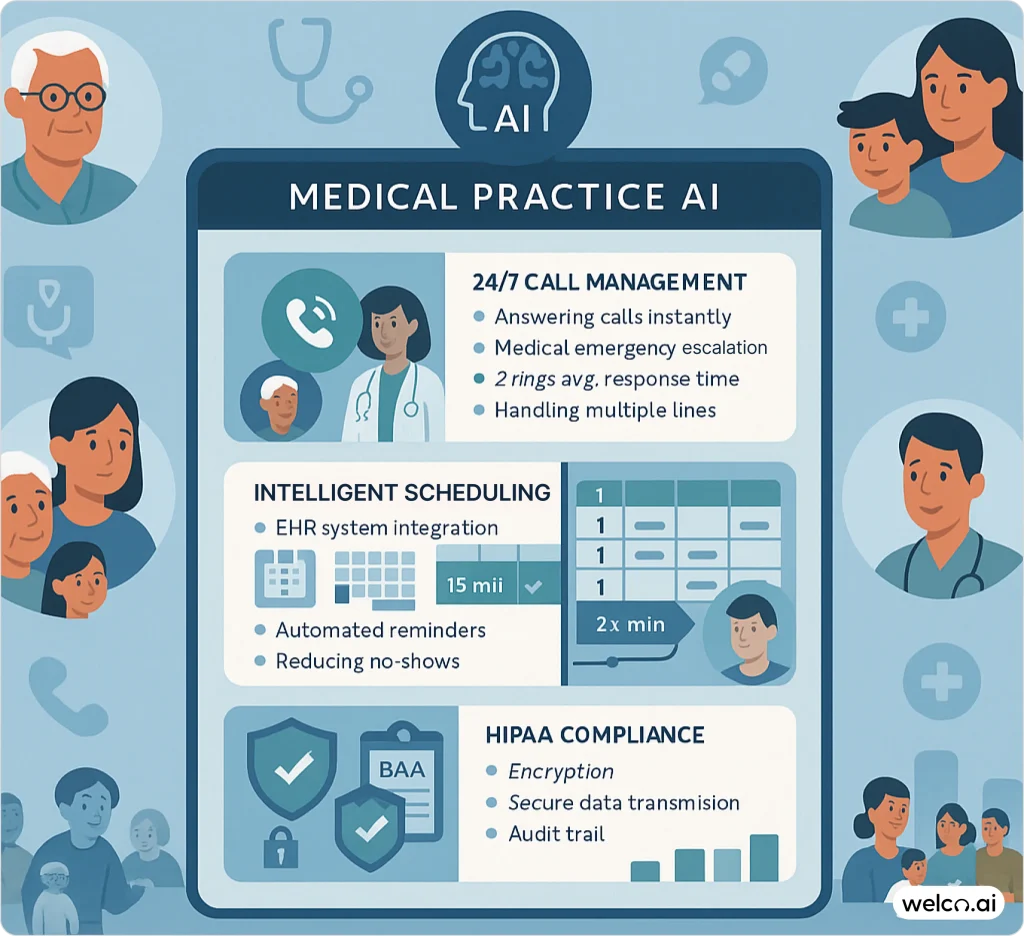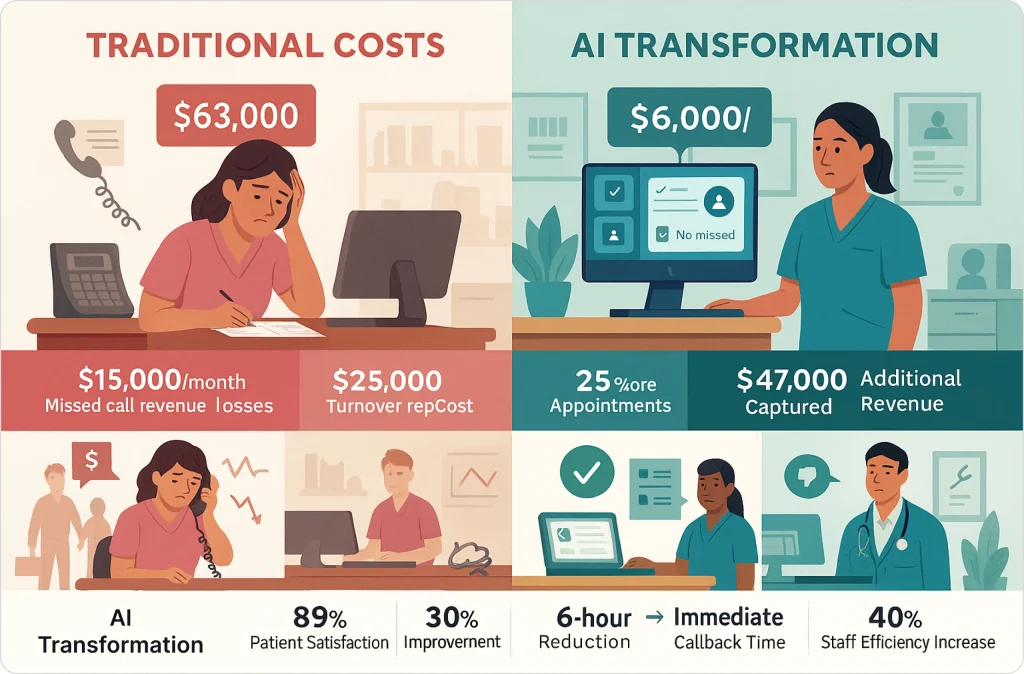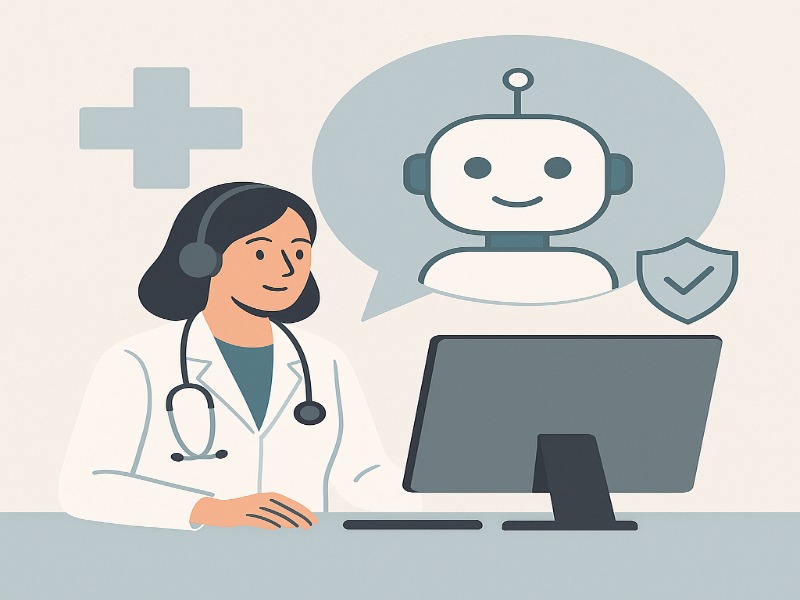When Missing a Call Costs $180,000
At 2:47 AM, Maria Rodriguez called Dr. Patricia Martinez’s family practice with chest pains. Six rings. Voicemail. By morning, Maria was in the ER with a $12,000 bill for what should have been a $180 office visit.
But here’s the kicker: this wasn’t a one-off disaster.
Dr. Martinez lay awake at night wondering how many patients she’d failed to reach. Was someone having a heart attack while her phone rang endlessly? How many families were rushing to expensive emergency rooms because they couldn’t get through to her office?
The numbers were brutal—she was missing 40% of after-hours calls, hemorrhaging $15,000 monthly while patients suffered. Her human receptionist was fantastic during business hours, but nights, weekends, and lunch breaks? Pure chaos.
Sound familiar?
Then Dr. Martinez discovered AI receptionists for doctors built specifically for medical practices. Six months later, she’s capturing every single call and pulling in an extra $47,000 annually—while sleeping soundly knowing no patient goes unanswered.

Similar transformation stories are happening across industries—from legal firms streamlining confidential call management to small businesses achieving growth through AI reception—but healthcare practices see some of the most dramatic results.
Here’s how she did it (and how you can too).
The Healthcare Phone Crisis Nobody Talks About
Most medical practices are bleeding money through their phone systems, and they don’t even realize it. While you’re focused on patient care, revenue is literally hanging up on you.
The brutal numbers:
- 30-50% of patient calls go unanswered after hours
- Average practice loses $10,000-$15,000 monthly from missed calls
- Human receptionists cost $63,000+ annually (salary + benefits)
- 35% annual turnover in medical reception roles
But missed revenue is just the tip of the iceberg. Every unanswered call represents:
- A frustrated patient who might switch providers (67% will after poor phone experiences)
- Someone heading to urgent care instead of your office
- Scathing online reviews mentioning your “impossible-to-reach” practice
- Your exhausted staff dealing with angry callback storms the next morning
The American Medical Association found that practices lose 27% of potential new patients purely because people can’t get through on the phone.
That’s not a communication hiccup—that’s a financial hemorrhage.
Enter the AI Medical Receptionist (It’s Not What You Think)
Forget everything you know about those annoying chatbots and soul-crushing automated phone trees. Modern AI medical receptionists are different beasts entirely.
They don’t just answer phones—they run your entire front desk operation with the intelligence of your best human receptionist, but without sick days, lunch breaks, or Monday morning attitudes.
Now, I know what you’re thinking: “Will patients actually talk to AI? What about HIPAA compliance? Can it really handle medical emergencies?”
Let me address those concerns while showing you exactly what these healthcare AI systems do.

The Three Game-Changers That Matter Most
1. Never Miss Another Call (Ever)
- Answers within 2 rings, 24/7/365
- Handles multiple calls simultaneously—no more busy signals
- No voicemail tag or “please call back during business hours”
2. Intelligent Appointment Scheduling
Here’s where most practices get skeptical, but this is where AI really shines. The system schedules directly in your EHR system, knows Dr. Smith prefers 15-minute slots while Dr. Johnson needs 30 minutes, and sends appointment reminders that cut no-shows by 30%.
One pediatric practice told me: “I thought it would mess up our complex scheduling. Instead, it schedules better than our humans ever did. No more double-bookings during flu season.”
3. HIPAA-Compliant Clinical Integration
And yes, it handles the security concerns that keep you up at night. Every conversation is encrypted, logged, and audited—actually more secure than human staff who might overhear conversations or lose paperwork. The AI processes prescription refills following your exact protocols, collects insurance information, and when someone calls with chest pain at 2 AM? It immediately escalates to your on-call provider.
This level of security and compliance management is particularly crucial for healthcare practices, though similar financial services compliance and security standards are being adopted across regulated industries.
Real Results from Real Practices (No BS)
Dr. Sarah Chen – Family Practice, Austin, TX
Before: Missing 40% of after-hours calls, losing $15K monthly
After 6 months: Zero missed calls, $47K additional revenue
ROI: 340% in year one
“I’ll be honest—I was convinced patients would hate talking to a robot. Boy, was I wrong. They love getting immediate answers instead of waiting hours for callbacks. Our patient satisfaction scores jumped 34% just from being reachable 24/7.”
Metro Pediatrics – Denver, CO (3 locations)
Challenge: Drowning in calls during flu season
Results: 45% reduction in administrative costs, 28% more appointments booked
“Flu season used to be our nightmare. Parents calling every hour, staff overwhelmed, kids not getting seen fast enough. Now the AI handles all the routine ‘is this normal?’ calls, and we can focus on the kids who actually need immediate attention.”
Riverside Cardiology – Tampa, FL
Before: 6-hour average callback time for test results
After: Immediate response and automatic follow-up scheduling
Impact: 89% improvement in patient satisfaction
“The AI doesn’t get tired at 5 PM. When Mr. Johnson calls panicked about his EKG results, he gets an immediate response and a follow-up appointment scheduled before he hangs up. That peace of mind is priceless.”
The Numbers That’ll Make Your Accountant Do a Happy Dance
While healthcare practices see exceptional ROI from AI receptionists, the technology is creating similar wins across sectors. Hospitality industry reception solutions report comparable satisfaction improvements, and retail and e-commerce customer support operations are seeing similar cost reductions.
The Simple Math That Changes Everything
- Human receptionist: $63,000 annually (salary + benefits)
- AI medical receptionist: $3,600-$7,200 annually
- Your savings: $55,000-$59,000 per year
The Revenue Explosion
- 24/7 availability: +25% appointment volume
- Smarter scheduling: +15% revenue from reduced no-shows
- Emergency captures: +$8,000-$12,000 monthly
- Faster collections: Streamlined payment processing
The Hidden Goldmine
- No more turnover nightmare: Save $15,000-$25,000 per receptionist replacement
- Zero training headaches: No sick days, vacation coverage, or overtime
- Mistake elimination: 40% fewer scheduling errors
- Staff sanity: Your team focuses on patient care instead of phone chaos
Bottom line: Most practices see full ROI within 90 days. After that, it’s pure profit.
Now, I know what you’re thinking about concerns, but let me show you how simple this actually is first.

Getting Started (It’s Easier Than Hiring Your Last Receptionist)
Week 1: Connect to your medical office phone system and EHR, configure appointment types
Week 2: Test during business hours, train staff on new workflows
Week 3: Go live 24/7, optimize based on patient feedback
Most healthcare practices are fully operational within 14 days. The implementation process shares similarities with other industries—real estate lead qualification and management systems typically deploy in similar timeframes, and professional services client intake automation follows comparable setup procedures.
Calculate Your Rescue Mission
Take a hard look at these numbers:
- Current receptionist costs: $______
- Monthly revenue lost to missed calls: $______
- AI system cost: ~$500/month
- Your annual savings: $______
The practices seeing the biggest transformations start with a pilot program, prove the ROI, then wonder why they waited so long.
The Moment of Truth
Right now, while you’re reading this, three things are happening:
- A patient is calling your competitor because they got through on the first ring
- Your receptionist is burning out handling the same repetitive questions for the 47th time today
- Revenue is walking out the door every time your phone goes to voicemail
Every day you wait costs you money. Every missed call costs you patients. Every frustrated interaction costs you reputation.
Your competitors aren’t waiting. The smart practices in your area are already implementing AI receptionists, capturing every call, and watching their revenue climb while their stress levels plummet.
The question isn’t whether this technology works—the case studies prove it does. From healthcare to specialized solutions for legal firms and confidential call management, the results speak for themselves.
The question is: Will you be the practice that leads the change, or the one scrambling to catch up?
Ready to eliminate missed calls forever?
Because every minute you hesitate, another patient hangs up frustrated. Another appointment goes to your competitor down the street. Another $15,000 slips through your fingers.
Stop the bleeding. Start the demo.
Frequently Asked Questions
What if it doesn’t understand a complex medical situation?
Here’s the beautiful part—it doesn’t try to be a doctor. When Mrs. Patterson calls describing symptoms that could be serious, the AI documents everything perfectly and gets her to the right clinical staff immediately. It’s trained on thousands of medical scenarios and knows exactly when to escalate.
What about integration with our EHR system?
It connects seamlessly with Epic, Cerner, Allscripts—all the major systems. Setup takes about two weeks from start to finish. One practice manager told me: “The integration was smoother than our last software update.”
What happens when the system goes down?
AI platforms include redundant systems and automatic failover. If something goes wrong, calls route to backup systems or your designated staff phones. Most systems maintain 99.9% uptime—better than your human receptionist’s attendance record.
Will patients accept talking to AI?
Most patients prefer immediate AI response over voicemail or 20-minute hold times. The AI is programmed with empathy protocols and knows when to transfer to humans for complex situations. Patient satisfaction typically increases because they get instant help instead of callbacks.
How does HIPAA compliance work with AI?
AI systems are actually more secure than human staff. Every conversation is encrypted, logged, and audited. No risk of overheard conversations or mishandled paperwork. The AI provider signs a Business Associate Agreement taking full liability for compliance.
